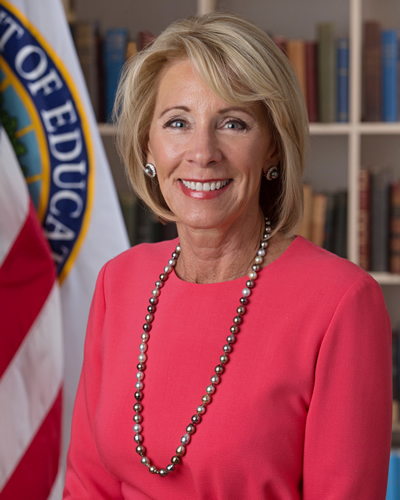
While emergency grants for colleges and their students from the CARES Act have gotten much attention in the past few weeks, that funding isn't the only stream of new federal money headed for higher education.
The U.S. Department of Education also is planning to distribute $127.5 million as part of its Reimagining Workforce Preparation grant program. But the department so far has released scant information about what sort of programs the grants should be used to fund, and through what sort of institutions.
"The Reimagining Workforce Preparation Grants are designed to expand short-term postsecondary programs and work-based learning programs in order to get Americans back to work and help small businesses return to being our country's engines for economic growth," reads an announcement from the department about the grants. A notice inviting applications gives an example of "course work that would help small businesses to recover and new entrepreneurs to thrive."
Secretary of Education Betsy DeVos in the announcement emphasized that the competition will be an opportunity for states to think creatively and strategically about what their workforce needs will be and how they should best support small businesses and entrepreneurs.
Which entities will be eligible for the grants, however, has yet to be announced. And the department said eligible applicants "may include state economic development or workforce agencies." The department estimates it will choose eight to nine grantees, prioritizing states with the highest coronavirus burden.
Given how little has been released about the program, all observers can do now is speculate about what the grants could, and should, do.
David Bergeron, a senior fellow for postsecondary education at the Center for American Progress, said that while there is much uncertainty about where the department intends the money to go, he hopes it's directed toward stackable credentials and other programs that have good employment outcomes.
"What I hope they will do is try to ensure that the way in which the funds are used builds on what we know about best practices in workforce development," he said. "And not just use this as an opportunity to give funding to the entities that they like -- use it to fund short-term training programs at for-profit colleges, for example."
A short-term certificate that leads someone to a dead-end job, Bergeron said, would be less than ideal.
Iris Palmer, a senior adviser for higher education and workforce at New America, said an ideal use of the money might be to help community colleges build capacity for career and technical programs.
"People are going to need help to reconnect to the labor market," she said, referencing the catastrophic unemployment numbers that have been released these past few weeks. "It's not a small amount of money to help people do that."
Palmer said that whether the grants will be successful in helping people re-enter the workforce will depend on whether officials prioritize increasing job quality.
"If we look back at the last recession, there's not a lot of evidence that short-term training was particularly effective in getting people back to work," she said. "Pretty much all the jobs that were created required degrees. Now that doesn't mean there aren't particular occupations where short-term training might be a really effective solution, but I don't know that entrepreneurship is one of those occupations as far as what I see with the research."
Palmer also cited varying quality and outcomes for short-term postsecondary programs, especially depending on how they're defined. A program of less than a year will have more good outcomes, she said, than one of less than a semester.
With the emergence of private training programs from companies like Google and Amazon, Bergeron said it is possible that the money could go toward those or similar programs.
"Given that the money is being provided to states, it's likely that there will be significant flexibility on the part of how states use that money," he said. "Certainly they might be used to fund alternative providers of training and not [be] limited to the traditional institutions of higher education."
The Department of Education did not respond to requests for comment for this article.
"Short" - Google News
May 12, 2020 at 02:04PM
https://ift.tt/35PlI18
Education Department's new $120 million in grants for short-term career programs - Inside Higher Ed
"Short" - Google News
https://ift.tt/2QJPxcA
Bagikan Berita Ini














0 Response to "Education Department's new $120 million in grants for short-term career programs - Inside Higher Ed"
Post a Comment